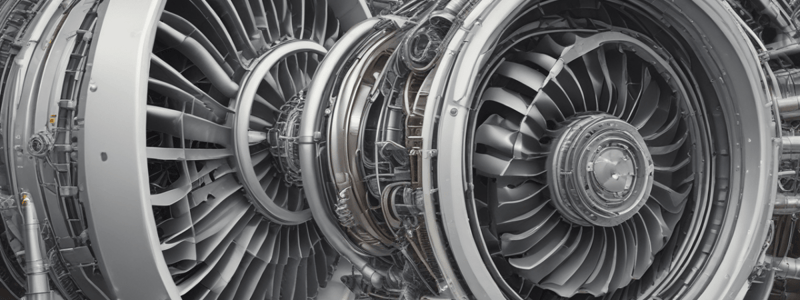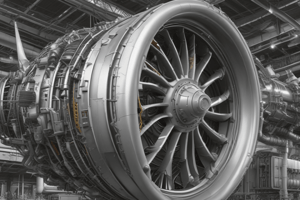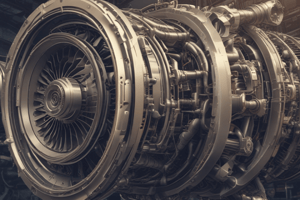Podcast
Questions and Answers
What is the main purpose of allowing air to diffuse in the front portion of the duct?
What is the main purpose of allowing air to diffuse in the front portion of the duct?
- To increase turbulence
- To achieve uniform pressure (correct)
- To reduce mass airflow
- To decrease compressor performance
What happens to inlet pressure as the aircraft reaches its desired cruising speed?
What happens to inlet pressure as the aircraft reaches its desired cruising speed?
- It remains constant
- It decreases significantly
- It increases slightly
- It increases significantly (correct)
What is the consequence of mismatch between the flight inlet, compressor, combustor, turbine, and tailpipe?
What is the consequence of mismatch between the flight inlet, compressor, combustor, turbine, and tailpipe?
- No effect on engine performance
- Reduced engine performance (correct)
- Unstable engine operation
- Improved engine performance
What is the primary difference between a turbojet and a turbofan inlet design?
What is the primary difference between a turbojet and a turbofan inlet design?
What is the result of ram recovery during aircraft acceleration?
What is the result of ram recovery during aircraft acceleration?
At what aircraft speed range does ram recovery typically begin to occur?
At what aircraft speed range does ram recovery typically begin to occur?
What is the primary objective of an air intake in a gas turbine engine?
What is the primary objective of an air intake in a gas turbine engine?
What is the identifier for the air entrance or flight inlet duct in a gas turbine engine?
What is the identifier for the air entrance or flight inlet duct in a gas turbine engine?
What can occur if the inlet duct is not maintained in a close to new condition?
What can occur if the inlet duct is not maintained in a close to new condition?
What is the purpose of using an inlet cover?
What is the purpose of using an inlet cover?
What is the consequence of a small discontinuity of airflow in the inlet duct?
What is the consequence of a small discontinuity of airflow in the inlet duct?
What is the recommended repair method for the inlet duct?
What is the recommended repair method for the inlet duct?
What is the primary purpose of a movable spike or plug in a moveable wedge inlet?
What is the primary purpose of a movable spike or plug in a moveable wedge inlet?
What type of shock waves are produced at the inlet when the movable spike is extended forward during transonic flight?
What type of shock waves are produced at the inlet when the movable spike is extended forward during transonic flight?
What is the characteristic shape of a bellmouth compressor inlet?
What is the characteristic shape of a bellmouth compressor inlet?
What is the benefit of using a bellmouth inlet in a helicopter or engine test cell?
What is the benefit of using a bellmouth inlet in a helicopter or engine test cell?
At what airspeed does the movable spike produce multiple oblique shock waves and a normal shock wave at the lip of the inlet?
At what airspeed does the movable spike produce multiple oblique shock waves and a normal shock wave at the lip of the inlet?
What is the shape of the movable spike or plug when it is fully extended during supersonic flight?
What is the shape of the movable spike or plug when it is fully extended during supersonic flight?
What triggers the opening of secondary air inlet doors in some aircraft?
What triggers the opening of secondary air inlet doors in some aircraft?
What is the purpose of facing an aircraft into the wind during an engine ground run?
What is the purpose of facing an aircraft into the wind during an engine ground run?
What can occur if the aircraft or conditions exceed expected flight attitudes, such as very high AOAs or sideslipping?
What can occur if the aircraft or conditions exceed expected flight attitudes, such as very high AOAs or sideslipping?
What is the purpose of adjusting the tension of the door spring in secondary air inlet doors?
What is the purpose of adjusting the tension of the door spring in secondary air inlet doors?
Which aircraft is more susceptible to crosswind-induced compressor stall with power settings above idle?
Which aircraft is more susceptible to crosswind-induced compressor stall with power settings above idle?
What is the correct procedure for adjusting the door spring in secondary air inlet doors?
What is the correct procedure for adjusting the door spring in secondary air inlet doors?
What is the primary reason for keeping the engine inlet duct smooth and clean?
What is the primary reason for keeping the engine inlet duct smooth and clean?
What is the primary concern when designing curves or bends in the intake duct?
What is the primary concern when designing curves or bends in the intake duct?
What is a common cause of damage to the internal acoustic lining of the intake duct?
What is a common cause of damage to the internal acoustic lining of the intake duct?
What is the primary purpose of the seal or joint between the engine and the intake duct?
What is the primary purpose of the seal or joint between the engine and the intake duct?
What is the primary condition under which icing of the engine and intake duct leading edges is most likely to occur?
What is the primary condition under which icing of the engine and intake duct leading edges is most likely to occur?
What is the primary consequence of damage to the intake duct leading edge?
What is the primary consequence of damage to the intake duct leading edge?
Flashcards are hidden until you start studying
Study Notes
Compressor Inlet Duct Design
- The air intake is a critical component of the gas turbine engine, providing the engine with a uniform supply of air at a minimum loss of energy.
- The air entrance or flight inlet duct is considered part of the airframe, not the engine, and is usually identified as engine Station 1.
- The inlet duct must deliver air to the compressor at a uniform pressure, distributed evenly across the whole inlet area.
- Even a small discontinuity of airflow can cause significant efficiency loss and engine performance problems.
- The inlet duct must be maintained in as close to new condition as possible to prevent drag and turbulence.
Inlet Duct Function
- The inlet duct allows the air to diffuse and increase in static pressure in the front portion of the duct.
- The air then progresses at a fairly constant pressure past the engine inlet fairing to the compressor.
- The engine receives its air with minimal turbulence and at a more uniform pressure.
Subsonic Inlet Duct
- Inlet pressure increases significantly as the aircraft reaches its desired cruising speed.
- The compressor reaches its aerodynamic design point and produces its optimum compression and fuel economy.
- The flight inlet, compressor, combustor, turbine, and tailpipe are designed to match each other at this point.
Turbofan Inlet
- The turbofan inlet is similar in design to the turbojet except that it discharges only a portion of its air into the gas generator, with the remainder passing into the fan.
Ram Pressure Recovery
- When the aircraft engine is operated on the ground, there is a negative pressure in the inlet due to the high velocity of the mass airflow.
- As the aircraft begins to move forward, air is rammed into the inlet, and ram recovery takes place.
- The resultant increase in inlet pressure cancels the drop in pressure in the inlet, and conditions return to ambient.
Moveable Wedge Inlet
- The movable spike or plug is positioned as necessary to alter the shape of the inlet as aircraft speed changes.
- The shape of the spike and surrounding inlet duct combine to form a movable C-D inlet.
- During transonic flight, the movable spike is extended forward to produce a normal shock wave, or bow wave, at the inlet.
Bellmouth Inlets
- Bellmouth compressor inlets are convergent in shape and are commonly found on helicopters and engine test cells.
- They present a mouth considerably wider in circumference than the engine compressor inlet and smoothly converge, funnelling air down to compressor inlet circumference.
Secondary Air Inlet Doors
- Some aircraft utilize a system of doors that allow extra air into the inlet duct.
- Secondary air inlet doors are designed to react to excess negative pressure within the inlet.
- If the pressure within the inlet falls below a predetermined limit, the suck-in doors are pushed open by the high external air pressure and allow extra airflow to the compressor.
Inlet Duct Losses
- Inlet duct losses can occur if the aircraft or conditions exceed expected flight attitudes, such as very high AOAs or sideslipping.
- These conditions can lead to a compressor stall.
- Crosswinds can disrupt the inlet airflow and increase the AOA of the air into the compressor, causing compressor stall.
Intake Airflow Distortion
- The engine inlet duct must provide a uniform supply of air to the compressor if the engine is to perform at optimum efficiency.
- To do this, the duct must create as little resistance as possible.
- The design of the intake should reduce turbulence to a minimum, ensuring that the engine receives its air at a uniform pressure across the face of the compressor.
Inlet Duct Maintenance
- The inlet duct must be kept smooth and clean to prevent drag and turbulence.
- Any damage in the intake area must be immediately repaired in accordance with the manufacturer's instructions.
- Curves or bends must be minimal and carefully blended.
- The walls of the duct must have flush rivets or fasteners if fitted.
- The seal or joint between engine and duct must be as accurate as possible.
Inlet Duct Anti-ice Systems
- Icing conditions can occur during flight through clouds containing supercooled water droplets or during ground operation in freezing fog.
- Icing conditions are most prevalent when operating the engine at high speeds on the ground.
- The effect of icing on engine operation can be significant, and anti-ice systems are necessary to prevent icing conditions.
Studying That Suits You
Use AI to generate personalized quizzes and flashcards to suit your learning preferences.




